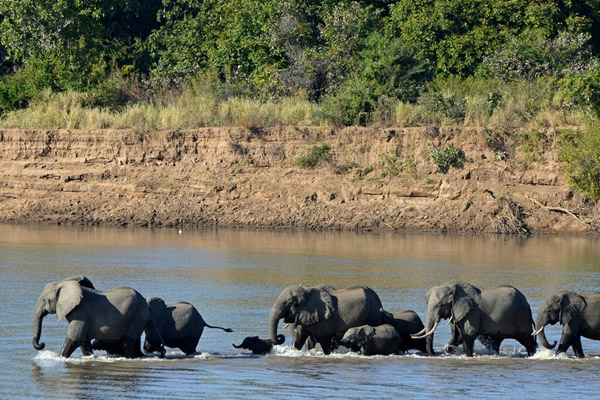Hillary and Chelsea Clinton on Thursday deployed their mother-daughter star power to help the effort to save African elephants, brokering an $80m effort to stop the ivory poaching which threatens the animals with extinction.
The crackdown on 50 poaching hot spots in Africa involves several conservation groups and African governments. But conservation leaders, unveiling the plan at the Clinton Global Initiative (CGI) annual meeting, went out of their way to credit Hillary Clinton for giving prominence to the issue of the illegal trade in wildlife while she was secretary of state.
“She has been directly involved,” said Cristián Samper, president of the Wildlife Conservation Society, at a press conference. “She personally reached out to a number of African leaders.”
The CGI anti-poaching plan was the first big international cause championed by Hillary Clinton after she stepped down as secretary of state at the start of this year, after four years in the job. Clinton also gave prominence to wildlife trafficking as a national security threat during her time in the Obama administration. The White House has also taken up the issue, with a new initiative to stop poaching.
The funds now mobilized will be used to hire and train 3,100 park rangers at 50 sites in eastern and central Africa; to fund sniffer-dog teams along the top smuggling routes; and to train law-enforcement officials and judges responsible for prosecuting international trafficking gangs. The CGI is looking to raise an additional $70m for the anti-poaching plan over the next three years.

A herd of elephants in South Luangwa National Park, Zambia. Photo by: Gabriel Gallice.
Stopping the illegal trade in wildlife will take a far broader effort than arresting individual poachers, the conservation groups said.
“The poor guy that goes out there with a gun, they are cannon fodder,” said Patrick Bergin, president of the African Wildlife Foundation. “We need to go higher up the food chain. There are people commissioning this ivory.”
About 285,000 elephants—or two-thirds of the entire elephant population in Africa—live in the targeted areas. The money will also be used to lobby for a ban on all commercial ivory sales until elephant populations are brought back to healthy levels in Africa, conservation leaders said.
Hillary and Chelsea Clinton were introduced to the poaching threat to elephants during a visit to Africa in 1997. Chelsea Clinton made a return trip last July. The Clintons’ involvement boosts the profile of the fight against the illegal wildlife trade at a time when the elephants need it most, conservation leaders said. Some 95 African elephants are killed every day for their ivory – park rangers in Zimbabwe this week found the corpses of 90 that had been poisoned with cyanide—in an illegal trade that has grown exponentially since the late 1990s.
A kilo of ivory can sell for $3,000 to collectors in China or America—the prospect of huge profits has attracted criminal gangs and rebel militias, such as the Lord’s Resistance Army, which originated in Uganda, or al-Shabaab in Somalia, which claimed last weekend’s deadly attack on a Nairobi mall.
The initiative announced on Thursday brings together the main conservation groups, including the Wildlife Conservation Society, the African Wildlife Foundation, Conservation International, the International Fund for Animal Welfare and the World Wildlife Fund, as well as a number of African governments. These include Botswana, Ivory Coast, Gabon, Kenya, South Sudan, Malawi and Uganda.
Original story: Suzanne Goldenberg. Hillary and Chelsea Clinton unveil $80m effort to fight illegal ivory trade. The Guardian – September 26th, 2013
Related articles

(09/12/2013) Africa’s elephant poaching crisis doesn’t just threaten a species, but imperils one of humanity’s most important links to the natural world and even our collective sanity, according to acclaimed photographers and film-makers, Cyril Christo and Marie Wilkinson. Authors of the book Walking Thunder – In the Footsteps of the African Elephant, Christo and Wilkinson have been documenting Africa’s titans in photos and film for several years. In 2011, the pair released a film Lysander’s Song (named after their son an avid fan of elephants) which depicts the millennial-old relationship between humans and elephants.
U.S. to crush its six ton ivory stockpile
(09/10/2013) On October 8th, the Obama administration will publicly destroy its ivory stockpile, totaling some six tons, according to a White House forum yesterday on the illegal wildlife trade. The destruction of the stockpile—via crushing—is meant to send a message that the U.S. is taking a tougher stand on illegal the wildlife trade, which is decimating elephants across Africa and imperiling other animals worldwide. The U.S. remains one of the biggest destinations for ivory and other illegal animal part aside from East Asia.
Elephant killer gets five years in prison in the Republic of Congo
(08/01/2013) The Congolese Supreme Court has ordered Ghislain Ngondjo (known as Pepito) to five years in prison for slaughtering dozens of elephants for their ivory tusks. The five year sentence is the maximum in the Republic of Congo for poaching. Ngondjo was considered the “kingpin” of an elephant poaching group; in addition to killing pachyderms, Ngondjo recruited new poachers and made death threats to park rangers and staff in Odzala National Park.
Zoos call on governments to take urgent action against illegal wildlife trade (photos)

(07/24/2013) In a single night in March, a band of heavily-armed, horse-riding poachers slaughtered 89 elephants in southern Chad, thirty of which were pregnant females. The carnage was the worst poaching incident of the year, but even this slaughter paled in comparison to the 650 elephants killed in a Cameroon park in 2012. Elephant poaching is hitting new records as experts say some 30,000 elephants are being killed every year for their ivory tusks. But the illegal wildlife trade—estimated at $19 billion—is not just decimating elephants, but also rhinos, big cats, great apes, and thousands of lesser-known species like pangolins and slow lorises. This growing carnage recently led to representatives of over 40 zoos and dozens of wildlife programs to call on governments around the world to take immediate action on long-neglected wildlife crime.
Hunting, logging could threaten long-term health of Congo forests by wiping out key animals
(07/23/2013) Unsustainable hunting of forest elephants, gorillas, forest antelopes, and other seed-dispersers could have long-term impacts on the health and resilience of Congo Basin rainforests, warns a study published today in a special issue of the journal Philosophical Transactions of The Royal Society B. Conducting a review of more than 160 papers and reports on trends in wildlife populations, hunting, and land use in the Congo Basin, an international team of researchers conclude that unless effective management plans are put into place, hunting pressure in the region is likely to increase, with knock-on ecological effects.
